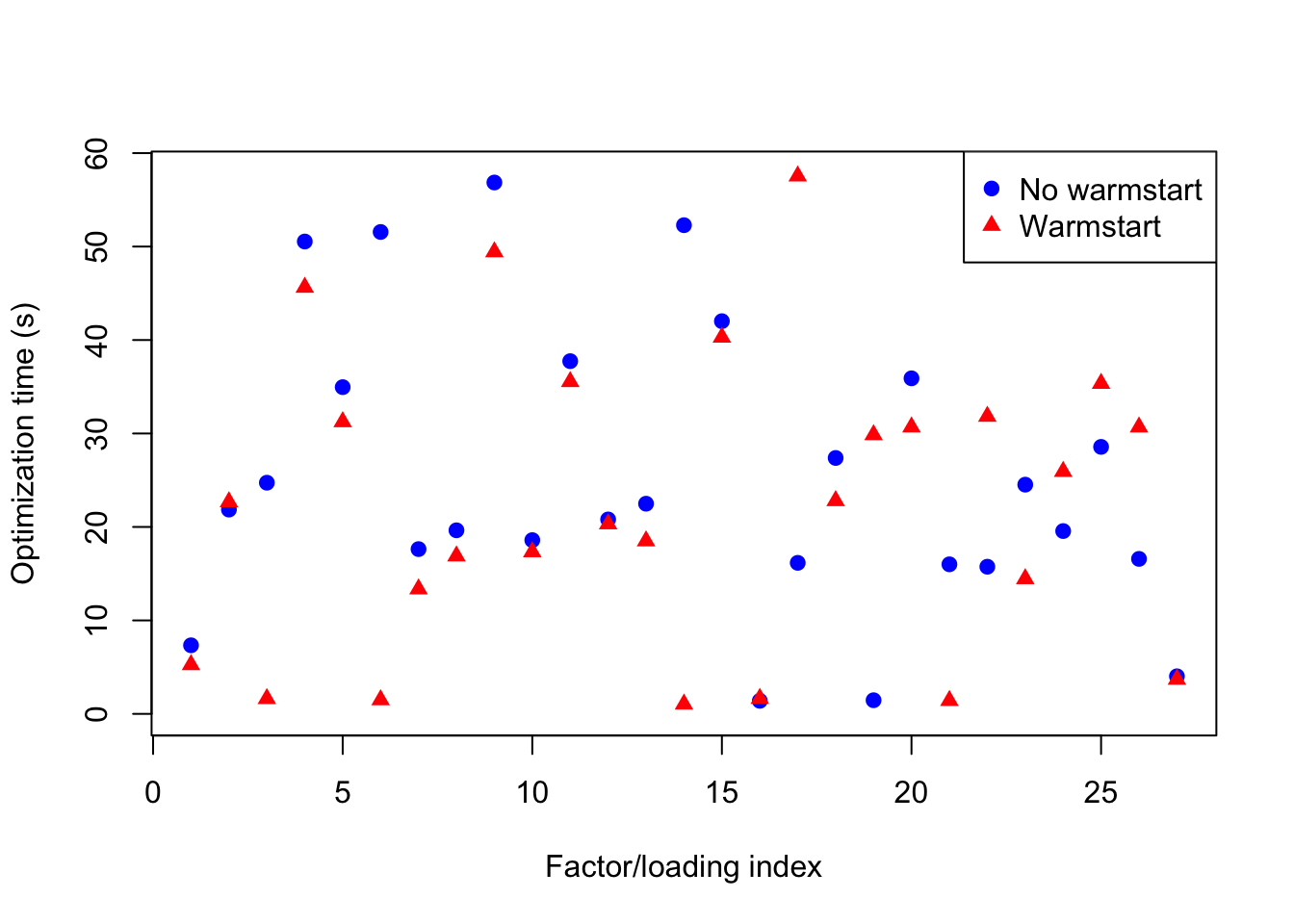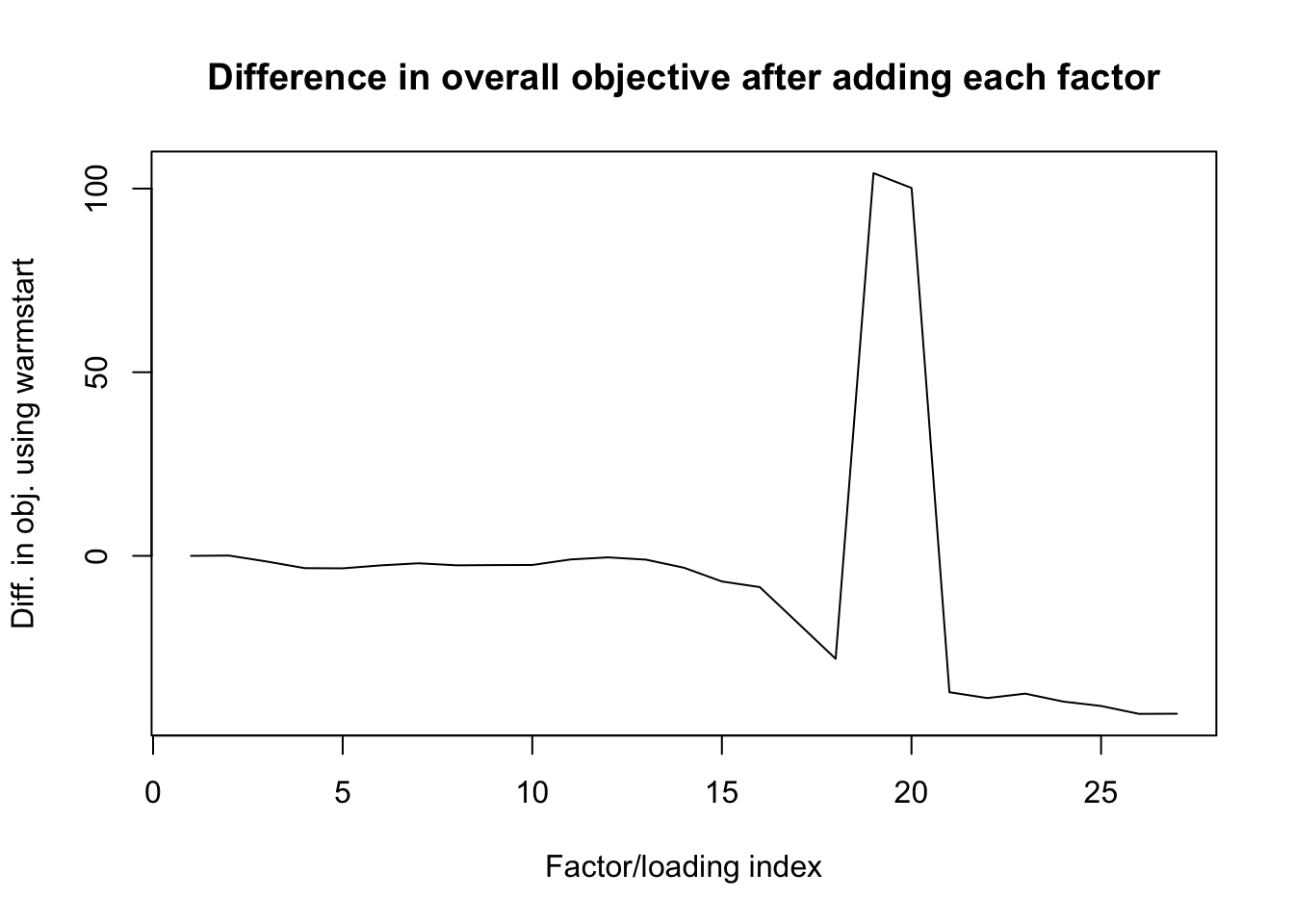Using warmstarts with ebnm_ash
Jason Willwerscheid
7/26/2018
Last updated: 2018-07-27
workflowr checks: (Click a bullet for more information)-
✔ R Markdown file: up-to-date
Great! Since the R Markdown file has been committed to the Git repository, you know the exact version of the code that produced these results.
-
✔ Environment: empty
Great job! The global environment was empty. Objects defined in the global environment can affect the analysis in your R Markdown file in unknown ways. For reproduciblity it’s best to always run the code in an empty environment.
-
✔ Seed:
set.seed(20180714)The command
set.seed(20180714)was run prior to running the code in the R Markdown file. Setting a seed ensures that any results that rely on randomness, e.g. subsampling or permutations, are reproducible. -
✔ Session information: recorded
Great job! Recording the operating system, R version, and package versions is critical for reproducibility.
-
Great! You are using Git for version control. Tracking code development and connecting the code version to the results is critical for reproducibility. The version displayed above was the version of the Git repository at the time these results were generated.✔ Repository version: 09d1888
Note that you need to be careful to ensure that all relevant files for the analysis have been committed to Git prior to generating the results (you can usewflow_publishorwflow_git_commit). workflowr only checks the R Markdown file, but you know if there are other scripts or data files that it depends on. Below is the status of the Git repository when the results were generated:
Note that any generated files, e.g. HTML, png, CSS, etc., are not included in this status report because it is ok for generated content to have uncommitted changes.Ignored files: Ignored: .DS_Store Ignored: .Rhistory Ignored: .Rproj.user/ Ignored: docs/.DS_Store Ignored: docs/figure/.DS_Store Untracked files: Untracked: data/greedy19.rds Untracked: data/warmstart2/ Unstaged changes: Modified: analysis/index.Rmd Modified: analysis/init_fn.Rmd Modified: analysis/init_fn2.Rmd Modified: analysis/warmstart.Rmd
Expand here to see past versions:
| File | Version | Author | Date | Message |
|---|---|---|---|---|
| Rmd | 09d1888 | Jason Willwerscheid | 2018-07-27 | wflow_publish(c(“analysis/warmstart2.Rmd”)) |
Introduction
I previously concluded that using warmstarts is more advantageous than not when ebnm_fn = ebnm_pn. Here I repeat the experiment with ebnm_fn = ebnm_ash.
Results
# devtools::install_github("stephenslab/flashr", ref="trackObj")
devtools::load_all("/Users/willwerscheid/GitHub/flashr")Loading flashr# devtools::install_github("stephenslab/ebnm")
devtools::load_all("/Users/willwerscheid/GitHub/ebnm")Loading ebnmgtex <- readRDS(gzcon(url("https://github.com/stephenslab/gtexresults/blob/master/data/MatrixEQTLSumStats.Portable.Z.rds?raw=TRUE")))
strong <- t(gtex$strong.z)# This block was run in advance.
res.no.warmstart <- flash_add_greedy(strong, Kmax=50, init_fn="udv_svd",
ebnm_fn="ebnm_ash", verbose=TRUE)
res.warmstart <- flash_add_greedy(strong, Kmax=50, init_fn="udv_svd",
ebnm_fn="ebnm_ash", warmstart=TRUE,
verbose=TRUE)
saveRDS(res.no.warmstart, "../data/warmstart2/nowarmstart.rds")
saveRDS(res.warmstart, "../data/warmstart2/warmstart.rds")res.no.warmstart <- readRDS("./data/warmstart2/nowarmstart.rds")
res.warmstart <- readRDS("./data/warmstart2/warmstart.rds")Optimization time
The total time (in seconds) needed to optimize factors is:
x1 <- unlist(res.no.warmstart$opt_time)
x2 <- unlist(res.warmstart$opt_time)
list(no.warmstart = sum(x1), warmstart = sum(x2))$no.warmstart
[1] 686.3349
$warmstart
[1] 606.5611The time required per factor/loading is as follows.
plot(x1, ylim=c(0, max(x1) + 1), pch=19, col="blue",
xlab="Factor/loading index", ylab="Optimization time (s)")
points(x2, pch=17, col="red")
legend("topright", c("No warmstart", "Warmstart"),
pch=c(19, 17), col=c("blue", "red"))
So using a warmstart often provides a speed-up, but not nearly as reliably as with ebnm_pn. Indeed, for several factor/loading pairs (17, 19, 22, 24, 26), the warmstart considerably slows things down.
Objective attained
As with ebnm_pn, using warmstarts yields a slightly worse overall objective.
list(no.warmstart = flash_get_objective(strong, res.no.warmstart$f),
warmstart = flash_get_objective(strong, res.warmstart$f))$no.warmstart
[1] -1252812
$warmstart
[1] -1252855The per-factor difference in objective is as follows.
o1 <- sapply(res.no.warmstart$obj,
function(obj) {max(unlist(obj))})
o2 <- sapply(res.warmstart$obj,
function(obj) {max(unlist(obj))})
plot(o2 - o1, type='l',
xlab="Factor/loading index",
ylab="Diff. in obj. using warmstart",
main="Difference in overall objective after adding each factor")
Conclusions
The advantages of using warmstarts are not nearly as compelling as they were with ebnm_pn. The speed-up is not as reliable, and the sacrifice in the final objective attained is greater. Further, I have not seen Rmosek fail for ebnm_ash in the same way that optim fails for ebnm_pn.
Session information
sessionInfo()R version 3.4.3 (2017-11-30)
Platform: x86_64-apple-darwin15.6.0 (64-bit)
Running under: macOS High Sierra 10.13.6
Matrix products: default
BLAS: /Library/Frameworks/R.framework/Versions/3.4/Resources/lib/libRblas.0.dylib
LAPACK: /Library/Frameworks/R.framework/Versions/3.4/Resources/lib/libRlapack.dylib
locale:
[1] en_US.UTF-8/en_US.UTF-8/en_US.UTF-8/C/en_US.UTF-8/en_US.UTF-8
attached base packages:
[1] stats graphics grDevices utils datasets methods base
other attached packages:
[1] ebnm_0.1-13 flashr_0.5-12
loaded via a namespace (and not attached):
[1] Rcpp_0.12.17 pillar_1.2.1 plyr_1.8.4
[4] compiler_3.4.3 git2r_0.21.0 workflowr_1.0.1
[7] R.methodsS3_1.7.1 R.utils_2.6.0 iterators_1.0.9
[10] tools_3.4.3 testthat_2.0.0 digest_0.6.15
[13] tibble_1.4.2 evaluate_0.10.1 memoise_1.1.0
[16] gtable_0.2.0 lattice_0.20-35 rlang_0.2.0
[19] Matrix_1.2-12 foreach_1.4.4 commonmark_1.4
[22] yaml_2.1.17 parallel_3.4.3 withr_2.1.1.9000
[25] stringr_1.3.0 roxygen2_6.0.1.9000 xml2_1.2.0
[28] knitr_1.20 devtools_1.13.4 rprojroot_1.3-2
[31] grid_3.4.3 R6_2.2.2 rmarkdown_1.8
[34] ggplot2_2.2.1 ashr_2.2-10 magrittr_1.5
[37] whisker_0.3-2 backports_1.1.2 scales_0.5.0
[40] codetools_0.2-15 htmltools_0.3.6 MASS_7.3-48
[43] assertthat_0.2.0 softImpute_1.4 colorspace_1.3-2
[46] stringi_1.1.6 lazyeval_0.2.1 munsell_0.4.3
[49] doParallel_1.0.11 pscl_1.5.2 truncnorm_1.0-8
[52] SQUAREM_2017.10-1 R.oo_1.21.0 This reproducible R Markdown analysis was created with workflowr 1.0.1